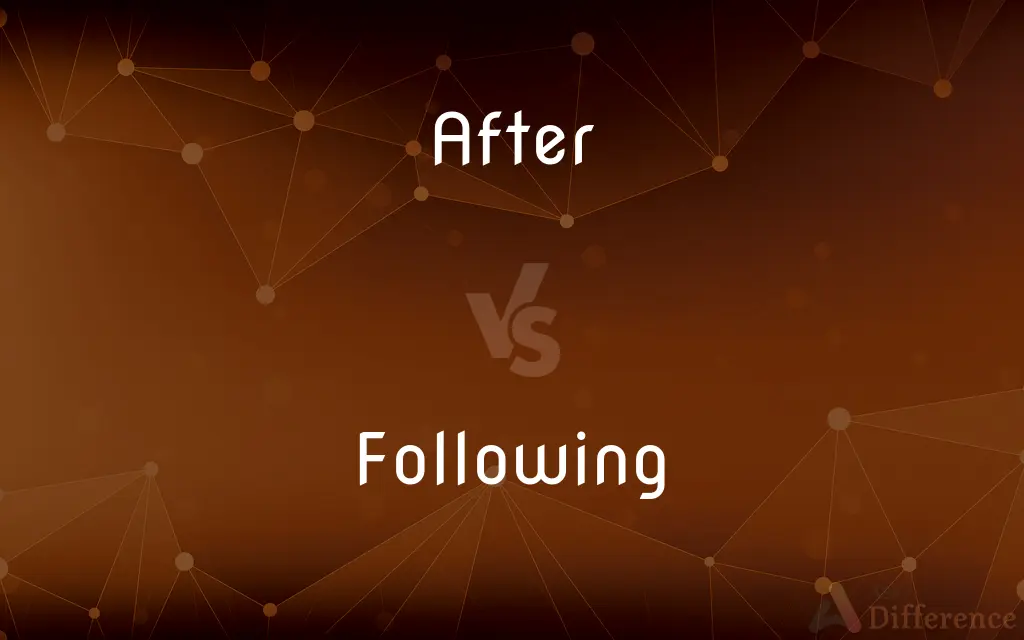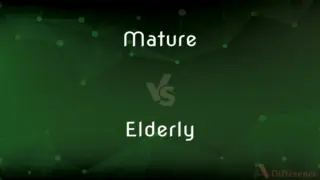After vs. Following — What's the Difference?
By Tayyaba Rehman — Updated on November 3, 2023
"After" denotes a sequential order or time, whereas "Following" suggests a result or adherence to what precedes.

Difference Between After and Following
Table of Contents
ADVERTISEMENT
Key Differences
"After" usually indicates a sequence in time or order, where one event happens subsequent to another. "Following" can have the same temporal sense but often carries an additional nuance of consequence or result. In using "after," there is a clear reference to something that occurs later than a specific point in time or after an event. Conversely, "following" can suggest that something happens as a consequence of another event, not just in sequence but potentially because of it.
Both "after" and "following" serve as prepositions that relate two parts of a sentence with a focus on time. "After" can also be used as an adverb, and it's common in references to past events in a straightforward temporal context. "Following," on the other hand, is less commonly used as an adverb and is more formal; it can also mean 'as a result of' or 'in accordance with,' often seen in legal or procedural documents.
The word "after" can function as a conjunction as well, connecting two clauses by denoting the time when something occurred, such as in "after you left, the mood changed." "Following" isn't typically used as a conjunction but rather stays within the role of a preposition or a noun, as in "the following day" or "the followers of a movement."
With "after," there's sometimes an implication of pursuit or a response to a previous action, which is not inherently present with "following." For example, "after the thief" suggests being in pursuit, whereas "following the procedure" conveys adherence to a set of rules or instructions. The former stresses the individual action taken in response, while the latter underscores compliance or accordance with something.
In sum, "after" is a more versatile word that can be used in various contexts relating to time, sequence, or even causation. "Following" is more specific and is often used in formal contexts to imply consequence, adherence, or in the context of being in line with something that has happened or been stated before.
ADVERTISEMENT
Comparison Chart
Part of Speech
Can function as a preposition, conjunction, or adverb.
Primarily used as a preposition or noun.
Temporal Sequence
Indicates something happening subsequent to a point in time.
Can imply consequence or in accordance with, in addition to sequence.
Formality
Used in both casual and formal contexts.
Often used in more formal contexts.
Causality
Does not inherently imply causality.
Can imply a result or consequence of what it follows.
Usage as a Conjunction
Often used to connect clauses ("after she left").
Not commonly used as a conjunction.
Compare with Definitions
After
Subsequent in time or place
After the movie, we went out for dinner.
Following
Subsequent to and because of
Following her promotion, she moved to a new office.
After
In search of or in pursuit
The detective went after the suspect.
Following
A group of supporters or enthusiasts
She attracted a large following with her blog.
After
In spite of
After all the advice, he still made a mistake.
Following
In agreement or support of
He acted following the advice of his mentor.
After
In the time following (an event or another period of time)
After a while he returned
He'd gone out with his secretary for an after-work drink
Shortly after their marriage they moved to Colorado
Following
Following is a 1998 independent neo-noir crime thriller film written and directed by Christopher Nolan. It tells the story of a young man who follows strangers around the streets of London and is drawn into a criminal underworld when he fails to keep his distance.
After
Behind
She went out, shutting the door after her
Following
Coming next in time or order
In the following chapter.
After
In pursuit or quest of
Chasing after something you can't have
Following
Now to be enumerated
The following people will report for duty.
After
Next to and following in order or importance
In their order of priorities health comes after housing
Following
Blowing in the same direction as the course of a ship or aircraft. Used of wind.
After
In allusion to (someone or something with the same or a related name)
They named her Pauline, after Barbara's mother
Following
A group or gathering of admirers, adherents, or disciples
A lecturer with a large following.
After
During the period of time following (an event)
Duke Frederick died soon after
Bath time ended in a flood after the taps were left running
Following
The item or items to be mentioned next
Please buy the following.
After
During the period of time following (an event)
Duke Frederick died soon after
Bath time ended in a flood after the taps were left running
Following
Subsequent to; after
Following dinner, brandy was served in the study.
After
Later
He was sorry in after years
Following
Coming next, either in sequence or in time.
See the following section.
After
Nearer the stern of a ship
The after cabin
Following
About to be specified.
The following words have no definition...
After
Behind in place or order
Z comes after Y in the alphabet.
Following
(of a wind) Blowing in the direction of travel.
The following wind sped us on our way.
After
Next to or lower than in order or importance.
Following
After, subsequent to.
Following the meeting, we all had a chat.
After
In quest or pursuit of
Seek after fame.
Go after big money.
Following
A group of followers, attendants or admirers; an entourage.
He had a loyal following.
After
Concerning
Asked after you.
Following
Vocation; business; profession.
After
Subsequent in time to; at a later time than
Come after dinner.
Following
(with definite article, treated as singular or plural) A thing or things to be mentioned immediately after.
The following is a recommendation letter from the president.
The following are the three most important questions.
After
Subsequent to and because of or regardless of
They are still friends after all their differences.
Following
Present participle of follow
After
Following continually
Year after year.
Following
One's followers, adherents, or dependents, collectively.
After
In the style of or in imitation of
Satires after Horace.
Following
Vocation; business; profession.
After
With the same or close to the same name as; in honor or commemoration of
Named after her mother.
Following
Next after; succeeding; ensuing; as, the assembly was held on the following day.
After
According to the nature or desires of; in conformity to
A tenor after my own heart.
Following
In the field of a telescope) In the direction from which stars are apparently moving (in consequence of the earth's rotation); as, a small star, north following or south following. In the direction toward which stars appear to move is called preceding.
After
Past the hour of
Five minutes after three.
Following
A group of followers or enthusiasts
After
(Irish) Used with a present participle to indicate action that has just been completed
"Sure I'm after seeing him not five minutes ago" (James Joyce).
Following
The act of pursuing in an effort to overtake or capture;
The culprit started to run and the cop took off in pursuit
After
Behind; in the rear.
Following
Going or proceeding or coming after in the same direction;
The crowd of following cars made the occasion seem like a parade
Tried to outrun the following footsteps
After
At a later or subsequent time; afterward
Three hours after.
Departed shortly after.
Following
In the desired direction;
A following wind
After
Subsequent in time or place; later; following
In after years.
Following
Immediately following in time or order;
The following day
Next in line
The next president
The next item on the list
After
Located near the stern of a vessel or the rear or an aircraft or spacecraft.
Following
About to be mentioned or specified;
The following items
After
Following or subsequent to the time that
I saw them after I arrived.
Following
As a result of
Following the guidelines ensured our safety.
After
Afternoon.
After
Afters Chiefly British Dessert.
After
Behind; later in time; following.
I left the room, and the dog bounded after.
They lived happily ever after.
I might come next month, or the month after.
After
Subsequently to; following in time; later than.
We had a few beers after the game.
The time is quarter after eight.
The Cold War began shortly after WWII.
After you with the salt/paper.
I told her to shut the door after her.
After
Behind.
He will leave a trail of destruction after him.
After
In pursuit of, seeking.
He's after a job; run after him; inquire after her health.
After
In allusion to, in imitation of; following or referencing.
We named him after his grandfather; a painting after Leonardo da Vinci.
After
Next in importance or rank.
The princess is next in line to the throne after the prince.
After
As a result of.
After your bad behaviour, you will be punished.
After
In spite of.
After all that has happened, he is still my friend.
I can't believe that, after all our advice against gambling, you walked into that casino!
After
Used to indicate recent completion of an activity
I was after finishing my dinner when there was a knock on the door.
After
(dated) According to an author or text.
After
Denoting the aim or object; concerning; in relation to.
To look after workmen; to enquire after a friend; to thirst after righteousness
After
(obsolete) According to the direction and influence of; in proportion to; befitting.
After
Signifies that the action of the clause it starts takes place before the action of the other clause.
I went home after we had decided to call it a day.
After
(dated) Later; second (of two); next, following, subsequent
After
At or towards the stern of a ship.
The after gun is mounted aft.
The after gun is abaft the forward gun.
After
Next; later in time; subsequent; succeeding; as, an after period of life.
After
Hinder; nearer the rear.
After
Behind in place; as, men in line one after another.
After
Below in rank; next to in order.
Codrus after Ph bus sings the best.
After
Later in time; subsequent; as, after supper, after three days. It often precedes a clause. Formerly that was interposed between it and the clause.
After I am risen again, I will go before you into Galilee.
After
Subsequent to and in consequence of; as, after what you have said, I shall be careful.
After
Subsequent to and notwithstanding; as, after all our advice, you took that course.
After
Moving toward from behind; following, in search of; in pursuit of.
Ye shall not go after other gods.
After whom is the king of Israel come out?
After
Denoting the aim or object; concerning; in relation to; as, to look after workmen; to inquire after a friend; to thirst after righteousness.
After
In imitation of; in conformity with; after the manner of; as, to make a thing after a model; a picture after Rubens; the boy takes after his father.
Our eldest son was named George after his uncle.
After
According to; in accordance with; in conformity with the nature of; as, he acted after his kind.
He shall not judge after the sight of his eyes.
They that are after the flesh do mind the things of the flesh.
After
According to the direction and influence of; in proportion to; befitting.
He takes greatness of kingdoms according to bulk and currency, and not after their intrinsic value.
After
Subsequently in time or place; behind; afterward; as, he follows after.
It was about the space of three hours after.
After
Located farther aft
After
Happening at a time subsequent to a reference time;
He apologized subsequently
He's going to the store but he'll be back here later
It didn't happen until afterward
Two hours after that
After
Behind or in the rear;
And Jill came tumbling after
After
In the style of or in imitation
He named his son after his grandfather.
After
Concerning or about
I asked after your health.
Common Curiosities
Can "after" be used in place of "following" in formal writing?
Often yes, but "following" may be preferred when implying adherence to rules or procedures.
Is "following" commonly used as an adverb?
No, it is not commonly used as an adverb.
Can "following" be used interchangeably with "after"?
While often interchangeable in indicating sequence, "following" can also imply consequence, which "after" does not.
Can "after" start a dependent clause?
Yes, "after" can introduce a dependent clause in a sentence.
Does "following" suggest a closer relationship between events than "after"?
It can suggest a consequential relationship, not necessarily closer, but more direct.
Is "after" ever used to indicate causation?
"After" can imply causation informally but is primarily used for temporal sequences.
Can "after" be used to refer to a position in a sequence?
Yes, "after" is often used to denote sequence, such as in lineups or lists.
Is "following" appropriate in informal conversation?
Yes, though it may sound more formal than "after."
Can "following" refer to people?
Yes, "following" can mean a group of supporters or enthusiasts.
Are "after" and "following" both prepositions?
Yes, both can act as prepositions.
Does "after" imply a more direct pursuit than "following"?
Yes, "after" often conveys a more active pursuit, while "following" can imply a passive sequence.
Are there instances when "after" and "following" are not synonymous?
Yes, particularly when "following" is used to imply 'as a result of' or in formal settings.
Does "following" always relate to time?
No, it can also relate to consequence, adherence, or support, not just time.
Is "after" used in legal documents?
Yes, but "following" is more prevalent for its formal tone and implications.
Can "following" mean 'subsequent to' in all contexts?
In most contexts, yes, but it may also carry additional implications depending on the context.
Share Your Discovery

Previous Comparison
Manganium vs. Manganese
Next Comparison
Mature vs. ElderlyAuthor Spotlight
Written by
Tayyaba RehmanTayyaba Rehman is a distinguished writer, currently serving as a primary contributor to askdifference.com. As a researcher in semantics and etymology, Tayyaba's passion for the complexity of languages and their distinctions has found a perfect home on the platform. Tayyaba delves into the intricacies of language, distinguishing between commonly confused words and phrases, thereby providing clarity for readers worldwide.















































